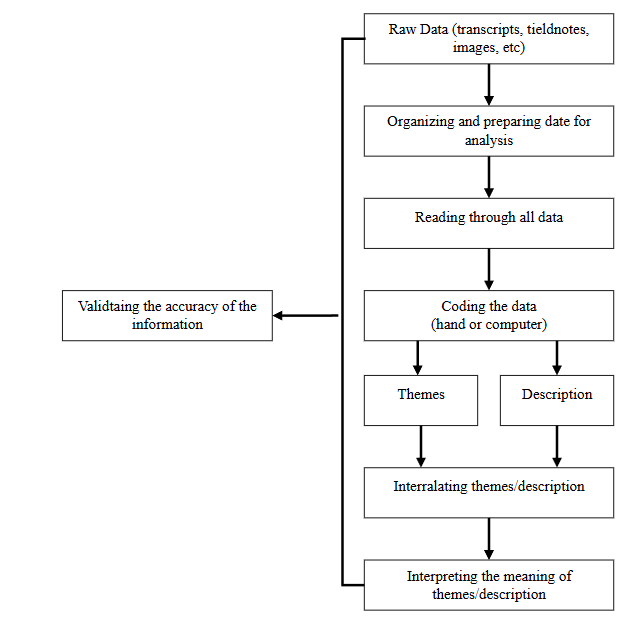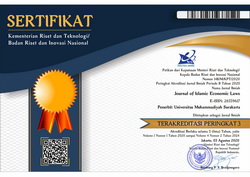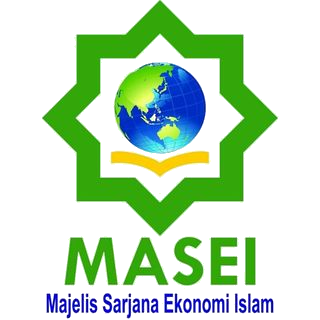Blue Economics in Islamic Economics Perspective: Fiqh Bi’ah Approach
Fiqh Bi’ah Approach
DOI:
https://doi.org/10.23917/jisel.v7i02.5200Keywords:
Blue Economics, Islamic Economics, Fiqh Bi’ahAbstract
This research explores the implementation of the blue economy in various Islamic countries, focusing on marine resource production and environmental conservation efforts. Conceptually, the blue economy aligns with the principles of fiqh bi'ah, which emphasize preserving natural resources while ensuring their sustainable use. The study employs an exploratory qualitative approach, using a comprehensive literature review of sources from predominantly Muslim countries such as Indonesia, Pakistan, Bangladesh, Iran, and the Maldives. Sources were selected based on their relevance to blue economy practices, Islamic environmental ethics, and sustainable development in fisheries and aquaculture. The findings indicate that the fisheries sector significantly contributes to economic growth but needs to be balanced with marine ecosystem conservation. Both capture fisheries and aquaculture production have the potential to enhance economic growth, while improvements in international fisheries trade are also crucial. By applying the principles of fiqh bi'ah, these countries can balance economic growth while ensuring marine environmental sustainability and compliance with Islamic values. The study concludes that integrating Islamic environmental principles into blue economy strategies can support long-term sustainability while fostering economic resilience.
Downloads
References
Abdullah, M. (2021). Shari’ah, Ethical Wealth and SDGs: A Maqasid Perspective. In Islamic Wealth and the SDGs (pp. 69–85). Springer International Publishing. https://doi.org/10.1007/978-3-030-65313-2_4
Alam, S., & Azam, M. (2023). Challenges and Prospects of Blue Economy for Pakistan. Journal of Asian Development Studies, 12(3). https://doi.org/10.62345/jads.2023.12.3.119
Alam, S., & Tomossy, G. F. (2017). Overcoming the SPS concerns of the Bangladesh fisheries and aquaculture sector: From compliance to engagement. Journal of International Trade Law and Policy, 16(2), 70–91. https://doi.org/10.1108/JITLP-01-2017-0002
Alharthi, M., & Hanif, I. (2020). Impact of blue economy factors on economic growth in the SAARC countries. Maritime Business Review, 5(3), 253–269. https://doi.org/10.1108/MABR-01-2020-0006
Al-Qardawi, Dr. Y. (2006). Norma&Etika Ekonomi Islam. Gema Insani Press.
ALshubiri, F. (2018). Assessing the impact of marine production manufacturing on gross domestic product indicators: Analytical comparative study of GCC countries. Maritime Business Review, 3(4), 338–353. https://doi.org/10.1108/MABR-08-2018-0027
Bank Indonesia. (2020). Islamic Economy and Finance Development Blueprint. Bi.Go.Id. https://www.bi.go.id/en/fungsi-utama/moneter/pengembangan-ekonomi/cetak-biru/default.aspx
BAPPENAS, & OECD. (2021). Blue Economy: Development Framework for Indonesia’s Economic Transformation.
Bax, N., Novaglio, C., Maxwell, K. H., Meyers, K., McCann, J., Jennings, S., Frusher, S., Fulton, E. A., Nursey-Bray, M., Fischer, M., Anderson, K., Layton, C., Emad, G. R., Alexander, K. A., Rousseau, Y., Lunn, Z., & Carter, C. G. (2022). Ocean resource use: building the coastal blue economy. Reviews in Fish Biology and Fisheries, 32(1), 189–207. https://doi.org/10.1007/s11160-021-09636-0
Bethel, B. J., Buravleva, Y., & Tang, D. (2021). Blue Economy and Blue Activities: Opportunities, Challenges, and Recommendations for The Bahamas. Water, 13(10), 1399. https://doi.org/10.3390/w13101399
Bhattacharya, P., & Dash, A. K. (2020). Drivers of Blue Economy in Asia and Pacific Island Countries: An Empirical Investigation of Tourism and Fisheries Sectors. ADBI Working Paper, 1161, 1–22.
Bir, J., Zaman, S., & Golder, R. (2020). A review on blue economy in Bangladesh: prospects and challenges. International Journal of Natural and Social Sciences, 7(4), 21–29. https://doi.org/10.5281/zenodo.4270719
Bsoul, L., Omer, A., Kucukalic, L., & Archbold, R. H. (2022). Islam’s Perspective on Environmental Sustainability: A Conceptual Analysis. Social Sciences, 11(6), 228. https://doi.org/10.3390/socsci11060228
Cai, J. N., Huang, H., & Leung, P. S. (2019). Understanding and Measuring the Contribution of Aquaculture and Fisheries to Gross Domestic Product (GDP). In FAO Fisheries and Aquaculture Technical Paper.
Creswell, J. W. (2007). Qualitative Inquiry & Research Design (Third Ed). SAGE Publications, Inc.
Butt, H. D., Aijaz, U., Asif Shamim, M., Sultana Lodhi, K., Hayat, A., & Mazhar, M. (2024). Leveraging CPEC For A Thriving Blue Economy And Coastal Development. Migration Letters, 21(S8), 1285–1321. www.migrationletters.com
FAO. (2015). Fishery and Aquaculture Country Profiles: The Islamic Republic of Iran. http://www.un.org/Depts/Cartographic/english/htmain.htm
FAO. (2024). The Exclusive Economic Zone: a Historical Perspective. Fao.Org. https://www.fao.org/4/s5280t/s5280t0p.htm
Gulzar, A., Islam, T., Khan, M. A., & Haq, S. M. (2021). Environmental Ethics towards Sustainable Development in Islamic perspective. Ethnobotany Research and Applications, 22. https://doi.org/10.32859/ERA.22.39.1-10
Hafidh, H. A. (2021). Zanzibar and the Establishment of Blue Economy Strategies. Journal of Resources Development and Management, March. https://doi.org/10.7176/jrdm/74-05
Hasina, S. (2024, August 8). Bangladesh economy under pressure amid ‘uncharted’ political turmoil. Al-Jazeera. https://www.aljazeera.com/economy/2024/8/8/bangladesh-economy-under-pressure-amid-uncharted-political-turmoil
Haves, E. (2022, November 24). House of Lords International Relations and Defence Committee: UN Convention on the Law of the Sea report. UK Parliament. https://lordslibrary.parliament.uk/house-of-lords-international-relations-and-defence-committee-un-convention-on-the-law-of-the-sea-report/
Hermanto, A. (2021). Fikih Ekologi (R. Yuhani’ah, Ed.). CV. Literasi Nusantara Abadi.
Hossain, M. A. R. (2015). An overview of Fisheries sector of Bangladesh. Research in Agriculture Livestock and Fisheries, 1(1), 109–126. https://doi.org/10.3329/ralf.v1i1.22375
Hussain, M. G., Failler, P., Karim, A. Al, & Alam, M. K. (2018). Major opportunities of blue economy development in Bangladesh. Journal of the Indian Ocean Region, 14(1), 88–99. https://doi.org/10.1080/19480881.2017.1368250
Islam, M. S., Jahan, H., & Al-Amin, A. K. M. A. (2016). Fisheries and aquaculture sectors in Bangladesh: an overview of the present status, challenges and future potential. Journal of Fisheries and Aquaculture Research, 1(1), 2–9. https://www.researchgate.net/publication/312032987
Jandra, M., Anshori, A., Kholili, H. M., & Rahman, A. (2019). Oceanic Verses of the Qur’an and Their Pointers To Technological Solutions. Heritage of Nusantara: International Journal of Religious Literature and Heritage, 8(2), 243–268. https://doi.org/10.31291/hn.v8i2.339
Jawaid, S. T., Siddiqui, M. H., Atiq, Z., & Azhar, U. (2019). Fish Exports and Economic Growth: The Pakistan’s Experience. Global Business Review, 20(2), 279–296. https://doi.org/10.1177/0972150918825422
Kapoor, R. V. (2020, April 3). Climate Change Vulnerabilities of the Maldives: Implications for India. National Maritime Foundation. https://maritimeindia.org/climate-change-vulnerabilities-of-the-maldives-implications-for-inidia/
Kasri, N. S., Bouheraoua, S., & Mohamed Radzi, S. (2023). Maqasid al-Shariah and Sustainable Development Goals Convergence: An Assessment of Global Best Practices (pp. 59–105). https://doi.org/10.1007/978-3-031-13302-2_4
Latifah, E. (2024). Fiqh al-Bī’ah and the Concept of Green and Blue Economy for Achieving Sustainable Development in the Context of SDGs. Invest Journal of Sharia & Economic Law, 4(1), 74–99. https://doi.org/10.21154/invest.v4i1.7732
Lembaga Ilmu Pengetahuan Indonesia. (2020). Thee Status of Indonesian Coral Reefs 2019.
Madani, K. (2021). Have International Sanctions Impacted Iran’s Environment? World, 2(2), 231–252. https://doi.org/10.3390/world2020015
Muneeza, A., & Mustapha, Z. (2021). Halal certification process for fisheries products in Maldives. Journal of Islamic Marketing, 12(2), 451–466. https://doi.org/10.1108/JIMA-02-2019-0035
Nisak, K. (2021). Usyur (Bea Cukai) dalam Sistem Perdagangan Internasional IslamMenurut Abu Ubaid dalam Kitab al-Amwal. JoIE: Journal of Islamic Economics, 1(1), 67–83.
Noor, F. (2018). Pengelolaan Sumber Daya Alam Berdasar Prinsip Fiqh Al-Bi’Ah. Jurnal Ilmiah Pendidikan Pancasila Dan Kewarganegaraan, 3(1), 47–55. https://doi.org/10.17977/um019v3i12018p047
Novaglio, C., Bax, N., Boschetti, F., Emad, G. R., Frusher, S., Fullbrook, L., Hemer, M., Jennings, S., van Putten, I., Robinson, L. M., Spain, E., Vince, J., Voyer, M., Wood, G., & Fulton, E. A. (2022). Deep aspirations: towards a sustainable offshore Blue Economy. Reviews in Fish Biology and Fisheries, 32(1), 209–230. https://doi.org/10.1007/s11160-020-09628-6
Plan Bleu. (2020). Blue Economy in the Mediterranean: Case studies, lessons and perspectives (Issue January).
PP Muhammadiyah. (2011). Teologi Lingkungan: Etika Pengelolaan Lingkungan dalam Perspektif Islam. Deputi Komunikasi Lingkungan dan Pemberdayaan Masyarakat, Kementerian Lingkungan Hidup, Dan Majelis Lingkungan Hidup Pimpinan Pusat Muhammadiyah.
PUSDATIN-KKP. (2018). Buku Pintar Kelautan dan Perikanan. Pusat Data, Statistik, dan Informasi. http://sidatik.kkp.go.id/files/src/9b51341263445211c37f801ac8458a4c.pdf
Qi, X. (2022). Building a bridge between economic complexity and the blue economy. Ocean and Coastal Management, 216(November 2021), 105987. https://doi.org/10.1016/j.ocecoaman.2021.105987
Rehman, A., Deyuan, Z., Hena, S., & Chandio, A. A. (2019). Do fisheries and aquaculture production have dominant roles within the economic growth of Pakistan? A long-run and short-run investigation. British Food Journal, 121(8), 1926–1935. https://doi.org/10.1108/BFJ-01-2019-0005
Risk, M. J., Haghshenas, S. A., & Razavi Arab, A. (2021). Cage aquaculture in the Persian Gulf: A cautionary tale for Iran and the world. Marine Pollution Bulletin, 166, 112079. https://doi.org/10.1016/j.marpolbul.2021.112079
Seymour, F., & Busch, J. (2017). Forests and SDGs: Taking a Second Look. World Resources Institute. https://www.wri.org/blog/2017/09/forests-and-sdgs-taking- second-look
Sha, J. (2019). The Emerging Blue Economy : Its Development and Future Prospects. Liberal Studies, 4(1).
Smith-Godfrey, S. (2016). Defining the blue economy. Maritime Affairs, 12(1), 58–64. https://doi.org/10.1080/09733159.2016.1175131
Sukamto. (2017). Pengelolaan Potensi Laut Indonesia dalam Spirit Ekonomi Islam (Studi terhadap Eksplorasi Potensi Hasil Laut Indonesia). Mailia: Jurnal Ekonomi Islam, 9(1), 35–62. http://yudharta.ac.id/jurnal/index.php/malia
Supriyanto, R. A. (2018). Southeast Asia and Maritime Security in the Bay of Bengal. https://www.researchgate.net/publication/325246808
Syaikh, ’Abdullah bin Muhammad Alu. (2016). Tafsir Ibnu Katsir (Edisi Terj). Pustaka Imam Syafi’i.
Tegar, D. R., & Saut Gurning, R. (2018). Development of Marine and Coastal Tourism Based on Blue Economy. In International Journal of Marine Engineering Innovation and Research (Vol. 2, Issue 2).
Thalhah, M., & Mufid, A. (2008). Fikih Ekologi: Menjaga Bumi Memahami Makna Kitab Suci (S. Malian, Ed.). Total Media.
Ubaidillah, M. H. (2010). Formulasi Konsep al-Maqasid al-Shari’ah dalam Konservasi dan Restorasi Lingkungan. Al-Qanun, 13(1), 26–52.
Wenhai, L., Cusack, C., Baker, M., Tao, W., Mingbao, C., Paige, K., Xiaofan, Z., Levin, L., Escobar, E., Amon, D., Yue, Y., Reitz, A., Sepp Neves, A. A., O’Rourke, E., Mannarini, G., Pearlman, J., Tinker, J., Horsburgh, K. J., Lehodey, P., … Yufeng, Y. (2019). Successful blue economy examples with an emphasis on international perspectives. Frontiers in Marine Science, 6(JUN), 1–14. https://doi.org/10.3389/fmars.2019.00261
Yunita, & Idami, Z. (2020). Pengelolaan Lingkungan Hidup Menurut Perspektif Fiqih. Jurnal Hukum Samudra Keadilan, 15(2), 210–222. https://doi.org/10.33059/jhsk.v15i2.2452

Submitted
Accepted
Published
How to Cite
Issue
Section
License
Copyright (c) 2024 Journal of Islamic Economic Laws

This work is licensed under a Creative Commons Attribution-ShareAlike 4.0 International License.



















